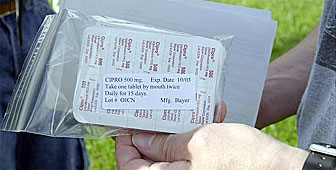
WHO urges calm amid rash of anthrax scares

The Geneva-based World Health Organisation (WHO) has urged people to be vigilant but not to panic following the rash of anthrax scares around the world, including in Switzerland.
The WHO warning came in the wake of a series of anthrax scares around the world. In Switzerland, two people received letters containing an unidentified white powder.
Subsequent tests showed that one, sent to a Novartis employee in Basel, contained no traces of anthrax. Results are not yet available for the second.
On Wednesday, Bern police said they were investigating a letter sent to Kraft Foods, in which the writer threatened to attack the company with anthrax. That letter is also currently being tested.
Iain Simpson, a spokesman for the WHO, said doctors in Europe and in the US had all the information needed to spot any possible case of anthrax.
“People are getting scared unnecessarily. The most important thing to remember is that it is not contagious,” said Simpson.
If caught early enough, the various types of anthrax can be treated with antibiotics. However, in the case of the most deadly inhaled form, the strain that killed a man in Florida, the early symptoms can be confused with a common cold.
Simpson also said people should consult their doctors prior to buying antibiotics. Demand for one of the best-known antibiotics – ciproflaxin – has soared in the US as terrified citizens seek to protect themselves.
Switzerland awaits results
The results of two anthrax tests in Switzerland are expected by Wednesday.
The first incident came to light on Monday after the Basel-based pharmaceutical giant, Novartis, revealed that one of its employees had undergone medical tests after receiving a letter containing an unidentified powder.
Novartis spokesman, Mark Hill, told swissinfo that the employee had alerted his superior about the letter on Sunday, in the wake of media reports about the anthrax scare in the US. Hill added that the employee had been given antibiotics against anthrax as a precaution, pending laboratory tests.
Hill said the letter in question was a “normal business-type of letter and the source of it was not in any way suspicious”.
Another person living in Basel also received a letter that was postmarked from Texas and contained a suspicious powder and a pamphlet about the Holocaust.
Martin Guertler from Canton Basel’s Department of Health said the matter was being taken very seriously, although he added that the possibility of genuine cases of anthrax occurring in Switzerland as “very small”.
Precautionary measures
Guertler advised anyone else who might receive similar letters to take simple precautionary measures.
“Don’t open or shake the letter and wash your hands with soap and water immediately after touching the envelope,” he says. “If you do open it and powder escapes, change your clothes, put them in an airtight container or plastic bag and take a shower.”
Calls flood hotline
A Swiss telephone hotline set up last week to deal with questions surrounding the anthrax scares has so far received up to 200 calls daily, according to Matthew Stadelmann of the national laboratory for biological weapons security. Many were from people planning to visit the US in the near future, he said.
“There have been a lot of hoax letters, and so until there is proof that anthrax has been used [in Switzerland], we don’t think there it’s a dangerous situation,” said Stadelmann.
He added that Switzerland, as an important producer of anthrax antibiotics, had enough medicines for the entire country for two months.
World gripped by fear
A rash of suspicious incidents were reported across the world on Monday and Tuesday, although the US remained the only country with confirmed cases.
At least 12 people have been exposed to anthrax in the US, and one of the victims has died.
Officials closed 10 senators’ offices on Tuesday, and confirmed that a letter sent to Senate Majority Leader Tom Daschle of South Dakota did contain anthrax.
Daschle is the first top government official directly affected by the scare.
swissinfo with agencies

In compliance with the JTI standards
More: SWI swissinfo.ch certified by the Journalism Trust Initiative





























You can find an overview of ongoing debates with our journalists here . Please join us!
If you want to start a conversation about a topic raised in this article or want to report factual errors, email us at english@swissinfo.ch.